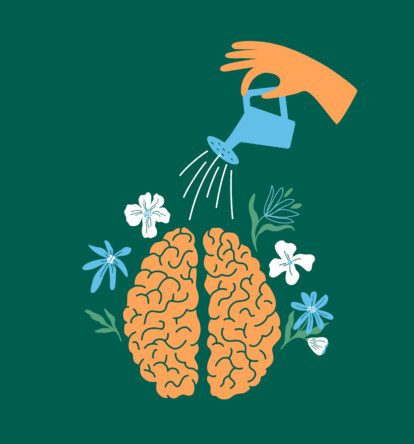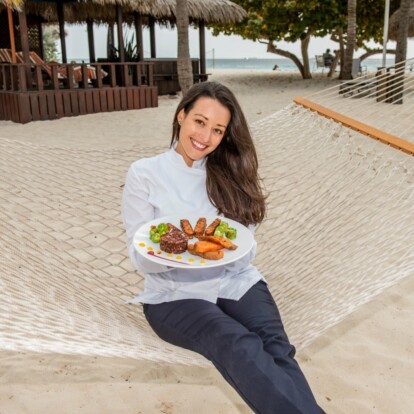Why young people are driving the vegan movement


A guest blog post by Meredith Marin (see author bio below).
According to Jon Kabat-Zinn, the founder of Mindfulness Based Stress Reduction, mindfulness is defined as paying attention, in a particular way, on purpose, in the present moment, non-judgmentally. To put it simply, mindfulness is a synonym for present moment awareness. It’s not about reflecting on the past, or even having a positive outlook on the future. Being mindful is not just about meditating and it doesn’t require that you repeat a mantra. It is a particular method of relating to your own thoughts.
Mindfulness is recognized in the scientific community as an evidence-based psychological intervention that can help people with a variety of challenges, including depression, anxiety, stress, healing from trauma and even coping with chronic pain. As a vegan entrepreneur myself, I have personally been practicing mindfulness for over 10 years now, and I speak from experience when I say that this is a transformational practice, if you commit to the journey.
The most introductory way to start practicing mindfulness today is to simply begin to bring your awareness to your own thoughts. The act of noticing that you are having thoughts run through your mind is an act of mindfulness. Once you get good at noticing when you’re having thoughts, you may start to notice the content of those thoughts. You may also notice the feelings and sensations that arise in your body when those thoughts are present. Noticing your own inner experience in a mindful way also means refraining from placing judgment on that experience. For example, you may notice that you have unhelpful or unpleasant thoughts, and instead of then telling yourself that there must be something wrong with you or that you should just “cheer up,” you tell yourself “I am having unpleasant thoughts” and leave it at that. Having these thoughts doesn’t make you a bad person, and it certainly does not mean that you won’t find success as a vegan entrepreneur. Becoming aware of your thoughts is the first step toward becoming more intentional about how you speak to yourself.
Our inner world influences our outer world. What we think and feel is not the only factor in our success as a business owner. In fact, if you have a business coach that is telling you to manifest anything you desire internally without putting an emphasis on your access to external resources and your support network, then it’s time to find a new coach! But that doesn’t mean we should discount the inner work we can do to set ourselves up for success.
Becoming an expert on your own thoughts is the first step to changing the self talk script in your mind. I’m sure you can imagine that a business owner who is hyping themselves up as their very own cheerleader feels more motivated to take action in their business and overcomes setbacks more quickly than a business owner who beats themselves up for mistakes.
As a CEO, vegan mentor, and vegan hospitality consultant, I have used my mindfulness tools in my professional life more than any other technical skills I know – more than my culinary skills, or my organizational skills, or my sales skills. Through cultivating self-compassion, learning to respond intentionally rather than react immediately, and staying level headed in the face of challenges, I have been able to grow my business during a pandemic, an international move, and a challenging pregnancy. I’m excited to share with you the top three ways that I believe mindfulness can help you as well as you get started in including mindfulness in your mission-driven business journey.

To combat imposter syndrome
You might have heard of “imposter syndrome” as a term to refer to this idea that you aren’t qualified to do your job. The irony is that the people who feel this way are usually some of the most highly qualified people. Maybe you just graduated with a degree or certification and are nervous to get started because you think you’re not ready, or that you won’t be as good as those who have more experience. You essentially feel like an “imposter” in your industry, like you don’t belong. The good news is that these ideas are just thoughts. And these thoughts can be dealt with through mindfulness, in that you can change the way you relate to these thoughts.
Imposter syndrome comes with thoughts like “I’m not good enough” or “No one will take me seriously” or “I don’t know enough to be successful with this.” When you notice thoughts like this creeping up, there are a few things you can do. You can give the thoughts less power over you by disregarding them, either by blocking the thoughts by saying “STOP” in your mind, or by imagining that these thoughts are floating by on a cloud or on a river. With this tool, you are letting the thoughts go and not giving them your attention. Another tool is to respond to these thoughts – are these thoughts true, or could you respond with something more true? For example, is it really true that you do not know enough to be successful? Or is it more true that you are highly trained and that you are giving it your best shot? Respond to your unhelpful thought with a more true, or more compassionate statement. And finally you might try using the tool of considering what you are afraid of. You do this by asking yourself – what if these unhelpful thoughts actually were true? What if it were true that I am not good enough to do this work? Then what? What is my fear? Maybe you have a fear of being embarrassed or unloveable, and in that case you deserve to give yourself compassion and unconditional love, or perhaps your fear is being unsafe or unemployed, and in that case you may do well with having a backup plan in the case that your entrepreneurial ideas do not work out, so that you can give it all you’ve got without the fear holding you back. It’s important to note that imposter syndrome often also comes with “comparison thinking,” and as you become a conscious observer of your thoughts you can notice how many of these thoughts are ideas about other people and what they may or may not be capable of in relation to you.
To ease symptoms of vicarious trauma and navigate work with non-vegans
Vicarious trauma, or secondary trauma, includes symptoms of traumatic stress that can occur when you have heard or seen details of someone else’s traumatic experience. If you are repeatedly exposed to another’s trauma, you may be more at risk. Vicarious trauma is often discussed in the context of helping professionals who work with trauma survivors. Vegan activists and vegan entrepreneurs are at risk for secondary traumatic stress symptoms. While activists are most often exposed to traumatic images and stories of abused and slaughtered animals, it doesn’t take being “active” to come across traumatic information. Most vegans have come across slaughterhouse imagery at some point on their journey, watched a documentary with details of animal abuse, or followed a social media account where the topic of abuse is discussed frequently. As a vegan, simply walking through the grocery store can trigger vicarious traumatic memories, as well as everyday activities such as watching a television show or sitting at a dining table with non-vegan family members. Within your business activities, you may also deal with trauma triggers depending on the nature of your work. Symptoms may include overwhelming feelings of anger, sadness or panic, guilt and shame or a feeling of “not doing enough”, loss of hope, fear, anxiety, using substances or self harm to cope with emotional pain. I encourage you to use your mindfulness lens to acknowledge that you are experiencing this. Know that there is nothing broken about you – this is a normal empathic response. Mindful breathing exercises as well as positive visualization can help if you are experiencing this, plus mindful movement and mindful social media boundaries.
It can be challenging to work with nonvegans in a professional setting if you are a mission-driven vegan entrepreneur, and if you’re experiencing symptoms of vicarious trauma then you may even feel personally attacked by your colleagues when your fight or flight response is triggered. In my line of work as a vegan hospitality consultant, I have had to walk through restaurant kitchens and see dead animal parts wrapped in plastic defrosting on the sink. I have had to discuss best selling dishes with chefs, who talk about lamb and foie gras in a positive way. In each of these experiences, I have had to use my mindfulness skills to stay calm and notice my triggers so that I could respond rather than react, which ultimately allowed me to have a bigger impact toward my mission.
To handle setbacks, combat burnout, and stay in the game
I started my company Vegan Hospitality toward the end of 2019, after several years of successful restaurant and hotel consulting, with the goal to work globally to help the hospitality industry transition toward vegan friendly guest services. A few months later, we were in the beginning of a global pandemic, and many of the client relationships I had cultivated were disappearing, as businesses shut down and hotels paused, and no one knew if or when things would bounce back. If it weren’t for my mindset and the ability to continuously bring myself back to my belief in my mission, I probably would have given up. I’m so glad I didn’t give up, or I wouldn’t be here today pursuing a mission that I feel so passionate about.
Now that’s not to say you shouldn’t pivot your business, add new services, or find other ways to take care of yourself financially when in crisis. I certainly did these things, in fact it’s during the pandemic when I created my Vegan Leadership Accelerator which is my signature mindfulness course that I now provide for all of the vegan entrepreneurs in my consulting network. Know this: failure is part of the game in this entrepreneurial journey, so expect it and get comfortable with it. And maybe – just maybe – you won’t even call these setbacks “failures” at all, and instead be able to identify growth opportunities throughout each experience you have as a mission-driven entrepreneur. Mindfulness can help you overcome and push through obstacles because when you are practicing non-judgment toward your thoughts, you are noticing that the self blame and shame falls away, and what you’re left with is self-validation. You can validate how the obstacle made you feel (angry! sad! frustrated!) without letting that experience mean anything about yourself or about what you are capable of doing in the future.
I’d love to connect with you on your journey and cheer you on, or answer any questions you have about mindfulness-based entrepreneurship. Feel free to reach out anytime on Instagram @meredithmarin or @vegan.hospitality or via email at [email protected].

Author Bio: Meredith Marin is a vegan entrepreneur and mindfulness-based vegan business coach with a master’s in social work. She specializes in helping vegans lead with confidence, live with purpose, and make an impact on the world. She is the Founder and CEO of global brand Vegan Hospitality, helping vegans create more plant-based options in their communities. Through Vegan Hospitality’s group training programs, Meredith brings mindfulness and community organizing tools to vegans to help them become more effective activists and entrepreneurs. Her Vegan Leadership Accelerator offers mindfulness education for vegan activists and entrepreneurs who want to infuse mindfulness tools into their businesses and their lives. Meredith currently lives in the U.S. with her vegan family and virtually coaches and teaches vegans all over the world to make an impact.